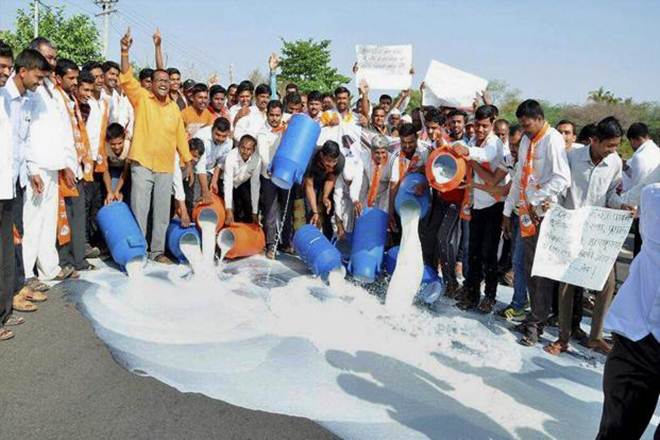On 5th June, a state-wide bandh was called in Maharashtra. The bandh was a part of an ongoing peasant strike which began on 1st June.The farmers were demanding that the government waive their farm loans due to the losses incurred. They were also demanding the implementation of the remunerative prices as recommended by Swaminathan Commission. The other demands were pension scheme for the farmers and the agricultural workers. Maharashtra Chief Minister, Devendra Fadnavis, did not agree to these demands when a delegation met with him on 3rd June. The bandh was in response to the failure of the Maharashtra Government to meet the demands of the farmers. This is a historic moment as it is the first time the peasants have called for the state bandh. Several towns, mandis, roads, shops, government offices etc. were closed down by the lakhs of farmers who were on the streets raising voice for their demands.
There are many peasant organisations involved in the historic movement. The unprecedented peasant strike has entered its sixth day. The farmers are refusing to take their produce like vegetables, fruits, and milk to the markets. Some even threw their produce on streets as an act of protest.
Maharashtra Rajya Kisan Sabha (AIKS) is also one of the the peasant organisations involved in the strike. AIKS state general secretary Dr Ajit Nawale, who was also part of the delegation that met with the CM, alleged that the two leaders – Jayaji Suryavanshi and Sandip Gidde – were siding with the government and wanted to end the strike. This betrayal by the two leaders enraged the farmers of the state further who resolved to continue their strike. A new coordination committee has been formed and will meet on 8th June in Nasik to decide the future plan of action. The farmers strike has been supported by the Left and other opposition parties; trade unions like CITU, AITUC have also been actively supporting the Peasant Strike.
On June 2 CPI (M) general secretary, Sitaram Yechury, had addressed a press meet in Mumbai supporting the peasant strike. Shiv Sena which is part of the NDA has also extended its support to the strike.
Reportedly, peasant organisations and farmers had asked for social activist Anna Hazare’s intervention but he refused. Reports have come that now Anna Hazare has offered to intervene to which the agitating farmers and organisations have refused.
The peasants of our country have been under tremendous distress for years now. Agrarian crisis is intensifying with the assault of neo-liberal policies. This assault has become more brutal under Modi government. With ‘Make in India’ project and the push toward the ‘ease of doing business’ policy, the Modi government has invested all of its energy and resources towards industry and corporates and none is given to the crisis facing agriculture sector.
The government one the one hand refuses to disclose names of big corporate defaulters but publicaly shames farmers for not being able to pay back their loans. A Media report claims that as many as 235 farmers have committed suicide in Maharashtra just in the month of March, 2017 alone. It seems that the BJP governments, both at centre and state, are not bothered about the just demands of farmers.






